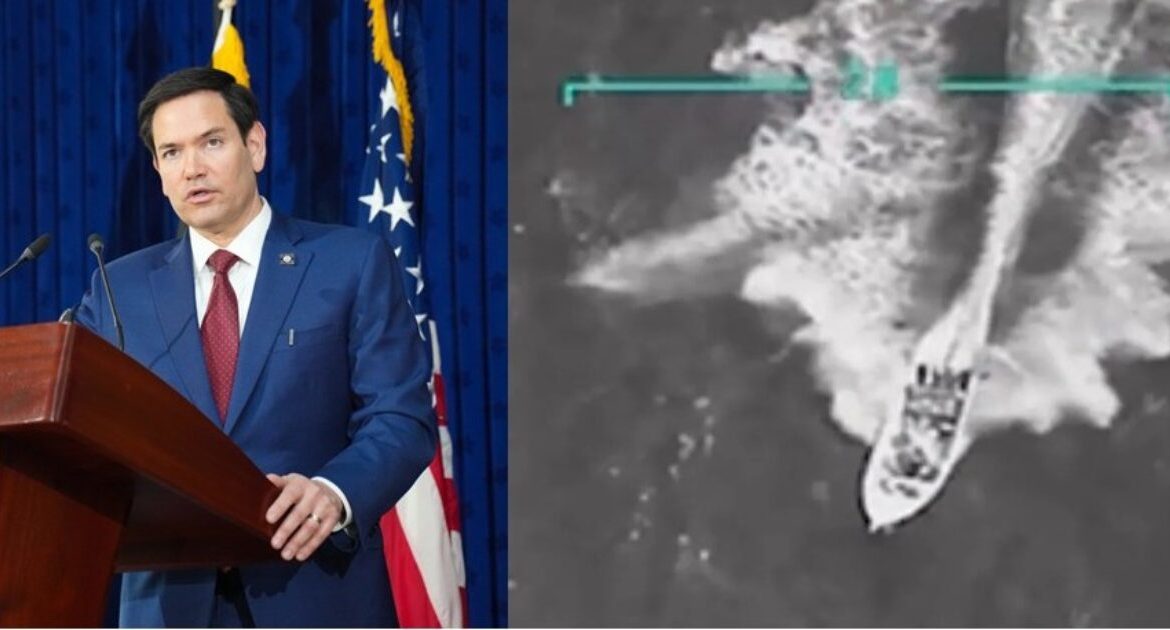
Rubio Tells Europe: They “Don’t Get to Decide How the U.S. Defends Itself”


On November 10, Secretary of War Pete Hegseth posted on X:
“At the direction of President Trump, two lethal kinetic strikes were conducted on vessels operated by Designated Terrorist Organizations. These vessels were known by our intelligence to be associated with illicit narcotics smuggling, were carrying narcotics, and were transiting along a known narco-trafficking transit route in the Eastern Pacific.Both strikes were conducted in international waters, and three male narco-terrorists were aboard each vessel.
All six were killed. No U.S. forces were harmed. Under President Trump, we are protecting the homeland and killing these cartel terrorists who wish to harm our country and its people.”
E.U. and U.N. officials decry President Trump’s use of the military against narcos, but as usual offer no alternative solution and refuse to condemn Latin American governments for allowing drugs to flow out of their countries into the U.S. and Europe. Secretary of State Marco Rubio, however, set them straight.
The U.S. began deploying Navy warships and personnel to the Caribbean in mid-August as part of anti-narcotrafficking operations to stem the flow of drugs into the United States. President Trump announced on September 2, 2025, that the Navy had carried out its first airstrike in the Caribbean on a boat from Venezuela, killing all eleven people on board. As of November 10, 2025, at least seventy-six narcos have been killed in nineteen strikes on twenty vessels, ten in the Caribbean Sea and ten in the Eastern Pacific.
The UN human rights chief Volker Turk condemned the strikes, saying they violate international law and amount to extrajudicial killings. He argued the U.S. has provided no evidence that anyone on the boats posed an imminent threat to life and urged Washington to stop the attacks and use law enforcement methods instead.
At the CELAC-EU summit in Colombia, EU foreign policy chief Kaja Kallas reminded leaders that force is lawful only in self-defence or with a UN mandate. Dutch Prime Minister Dick Schoof called for calm, Mexico’s Juan Ramon de la Fuente stressed sovereignty, and Colombia’s President Gustavo Petro called the deaths extrajudicial executions and identified at least one Colombian victim. European Council President António Costa urged dialogue over confrontation.
The criticism is ironic, given that Europe relies on America for its defense, Mexico functions as a narco state where the president and other politicians operate at the mercy of the cartels, and Colombian officials have been heavily sanctioned by the United States for enabling narcotrafficking. In the past two years, 2023 and 2024, Colombia saw staggering political violence, with more than thirty-four politicians and candidates killed in the 2024 election cycle alone. The previous year was described as the most violent on record for attacks on public officials.
As for Colombia, on October 24, 2025, the Treasury Department’s Office of Foreign Assets Control sanctioned four Colombian nationals for their involvement in the global illicit drug trade: President Gustavo Petro, his wife Veronica del Socorro Alcocer Garcia, his son Nicolás Fernando Petro Burgos, and Interior Minister Armando Alberto Benedetti Villaneda.
At a press conference, Secretary of State Marco Rubio, opened by rejecting foreign criticism of U.S. military operations. “I don’t think that the European Union gets to determine what international law is,” he said. “They certainly don’t get to determine how the United States defends national security.” Rubio emphasized that the U.S. is facing attacks from organized criminal and narco-terrorist groups in the Western Hemisphere, and that President Trump is acting to defend the country.
Rubio noted what he called a double standard among U.S. allies. He pointed out that European governments want Washington to supply “nuclear-capable Tomahawk missiles” to defend Europe, yet object when the U.S. positions aircraft carriers in its own hemisphere. The secretary said the President’s priority is clear: “His job is to protect the United States from threats against the United States, and that is what he’s doing in this operation.”
Addressing reports that Canada and the U.K. are not sharing intelligence for the mission, Rubio said the United States has its own assets in the region and is acting on the intelligence collected there. He would not discuss specifics but dismissed a recent CNN report as false. “It’s a fake story,” he said. Rubio criticized what he described as a recurring problem of low-level officials acting as anonymous sources despite being uninformed or having “an agenda.”
Rubio stressed that the mission is a counter-drug operation ordered by the President in response to national security threats. He said the operation could end immediately if traffickers stopped sending drug boats toward the United States. He described the Maduro regime as a “narco-terrorist regime” already indicted in U.S. courts, and as a trans-shipment hub that enables criminal groups to operate freely and ship drugs to the United States and Europe. Because Venezuelan authorities “openly cooperate with the shipping of these drugs,” Rubio said, European nations “should be backing us.”
He closed by repeating that the President will continue defending U.S. national interests against terrorist and narco-trafficking organizations.
The post Rubio Tells Europe: They “Don’t Get to Decide How the U.S. Defends Itself” appeared first on The Gateway Pundit.
